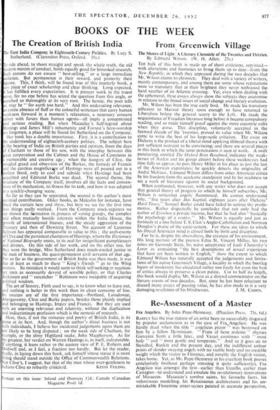From Greenwich Village
The Shores of Light: A Literary Chronicle of the Twenties and Thirties. By Edmund Wilson. (W. H. Allen. 25s.) THE bulk of this book is made up of short criticisms, rept inted- with alterations and footnotes to bring them up to date—from the New Republic, in which they appeared during the two decades that Mr. Wilson claims to chronicle. They deal with a variety of writers, mainly contemporary, and among them are some whose reputations were so transitory that at their brightest they never withstood the hard weather of an Atlantic crossing. Yet, even when dealing with the ephemeral, these essays always show the subjects they anatomise in relation to the broad issues of social change and literary evolution. Mr. Wilson has been the true early bird. He made his transitory adhesion to Marxist theory soon enough to have returned to Liberalism before the general scurry to the Left. He made the acquaintance of Freudian literature long before it became compulsory reading, and so made himself proof against the more eccentric cults when they arose. This discipline, voluntarily accepted in the licensed decade of the 'twenties, proved its value when Mr. Wilson came to write the best of his large-scale criticism. The essay on Dickens is the product of a liberal mind applying illiberal theory with just sufficient restraint to be convincing; and there are several pieces in this book in which the same penetration is seen at work. A swift puncturing, entitled The Oxford Boys Becahned, indicates the weak- nesses of Auden and his group almost before these weaknesses had time fully to appear; he puts Henry Miller in his place as just the last of the American expatriates; he quickly detects the originality of Andre Malraux. Edmund Wilson differs from other American critics by his freedom from the academic standpoint and by his readiness to see a work of literature against its social background. When confronted, however, with any writer who does not accept that general theory of progress to which he himself subscribes, Mr. Wilson is somewhat angrily flummoxed. He cannot understand why, "five years after Das Kapital, eighteen years after Dickens' Hard Times," Samuel Butler could have failed to satirise the profit- motive. Rather disgustedly he concludes that not only had the author of Erewhon a private income, but that he had also "basically the psychology of a refiner." Mr. Wilson is equally and just as furiously at a loss before T. S. Eliot's Anglo-Catholicism and Norman Douglas's praise of the caste-system. For these arc ideas to which his liberal American mind is closed both by birth and discipline. For he is, despite his shrewdness, the creature of his environment. His long memoir of the poetess Edna St. Vincent Millay, his two notes on Gertrude Stein, his naïve acceptance of Lady Chatterley's be Lover as containing "the best descriptions of sexual experience that have yet been written in English," show the extent to which Edmund Wilson has naturally accepted the judgements and limita- tions of his native Greenwich Village, a locality in which the bootleg liquor of modernity has circulated rather too freely for even the best of critics always to preserve a clean palate. Cut to half its length, this book would display Mr. Wilson as a shrewd commentator on the literary events of two decades. But, since he has been reluctant to discard many essays of passing value, he has also made in it a very


























 Previous page
Previous page